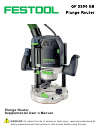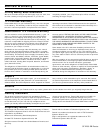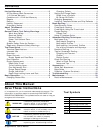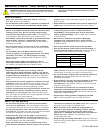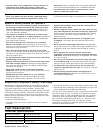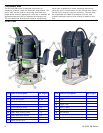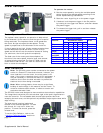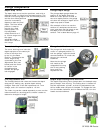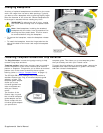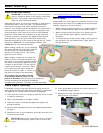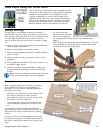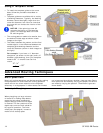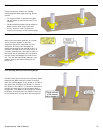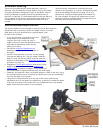
Supplemental User’s Manual 5
► Use the power tool, accessories, and tool bits etc. in
accordance with these instructions, taking into
account the working conditions and the work to be
performed. Use of the power tool for operations different
from those intended could result in a hazardous situation.
► To reduce the risk of fatal or serious injury, never
alter or misuse the power tool.
Service
► Have your power tool serviced by a qualified repair
person using only identical replacement parts. This
will ensure that the safety of the power tool is maintained.
Specific Safety Rules for Routers
► Hold the tool by the insulated gripping surfaces when
performing an operation where the cutting tool may
contact hidden wiring or its own cord. Contact with a
“live” wire will make the exposed metal parts of the tool
“live” and shock the operator.
► Use clamps or another practical way to secure and
support the workpiece to a stable platform. Holding the
work by hand or against your body leaves it unstable and
may lead to loss of control.
► This tool is intended for router bits not to exceed
89mm (3.5 inches). Using too large of a router bit will
result in the router bit striking the base of the tool, and may
also lead to a loss of control.
► The router bit shank must fit the size of the collet.
Using a router bit that cannot be firmly gripped by the collet
will result in the router bit coming loose, and may result in
serious personal injury.
► Do not exceed the router bit manufacturer’s maximum
speed rating of the router bit.
► Always make sure the work surface is free from nails
and other foreign objects. Cutting into foreign objects
can cause the router bit and/or the object to break apart
and strike the operator.
► Keep both hands on the router handles during
operation. Firmly controlling the router reduces the risk for
loss of control and injury.
► NEVER hold the piece being cut in your hands or
across your leg. It is important to support the work
properly to minimize body exposure or loss of control.
► Keep hands and body away from the cutting area or
below the router base.
► Before using the router, make sure the collet nut and
any other adjustment devices are securely tightened.
A loose adjustment device can unexpectedly shift, causing
loss of control, and loose rotating components can be
violently thrown.
► Never start the tool when the bit is engaged in the
workpiece. The cutting bit may grab and cause loss of
control.
► Never use dull or damaged router bits. Damaged bits
may break during use, and dull bits require additional force
to operate, which may cause the bit to break or a loss of
control.
► Never operate the router with the cutting tool
engaged in the workpiece without locking the plunge
lock knob. Unexpected changes in cutting depth can result
in a loss of control.
► Do not set the router down until the motor has come
to a complete stop. The exposed spinning bit can cause
serious injury or cause the router to move unexpectedly.
► To reduce the risk of burn injury, do not touch the
router bit immediately after use. The router bit may get
hot during use.
► Always unplug the tool before changing bits or
making adjustments. Failure to do so can result in the
tool starting unexpectedly.
Respiratory Exposure Safety Warnings
Substantial or repeated inhalation of dust and other airborne
contaminants, in particular those with a smaller particle size,
may cause respiratory or other illnesses. Various dusts
created by power sanding, sawing, grinding, drilling and other
construction activities contain chemicals or substances known
(to the State of California and others) to cause cancer, birth
defects or other reproductive harm. Some examples of these
chemicals/substances are:
► lead from lead-based paints;
► crystalline silica from bricks, cement, and other masonry
products;
► arsenic and chromium from chemically-treated lumber; and
► some wood dusts, especially from hardwoods, but also from
some softwoods such as Western Red Cedar.
The risk from these exposures varies, depending on how often
you do this type of work. To reduce your exposure to these
chemicals: work in a well ventilated area and use a properly
functioning dust extraction system. When the inhalation of
dust cannot be substantially controlled, i.e., kept at or near
the ambient (background) level, the operator and any
bystanders should wear a respirator approved by NIOSH for
the type of dust encountered.
Tool Description
Technical Specifications
Power Consumption 15 amps @ 120 volts Maximum Bit Diameter 89 mm (3.5”)
Motor Speed 10,000 – 22,000 RPM (no load) Collet Nut Size M22 x 1
Plunge Range 80 mm (3.1”) Weight 7.8 kg (17.2 lbs)
Fine Height Adjustment 20 mm (0.8”) All metric dimensions are controlling.



